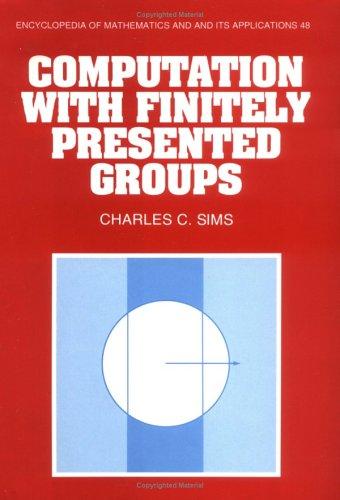Computation with finitely presented groups - Info and Reading Options
By Charles C. Sims

"Computation with finitely presented groups" was published by Cambridge University Press in 1994 - Cambridge [England], it has 604 pages and the language of the book is English.
“Computation with finitely presented groups” Metadata:
- Title: ➤ Computation with finitely presented groups
- Author: Charles C. Sims
- Language: English
- Number of Pages: 604
- Publisher: Cambridge University Press
- Publish Date: 1994
- Publish Location: Cambridge [England]
“Computation with finitely presented groups” Subjects and Themes:
- Subjects: Combinatorial group theory - Data processing - Finite groups - Group theory
Edition Specifications:
- Pagination: xiii, 604 p. :
Edition Identifiers:
- The Open Library ID: OL1728141M - OL4304333W
- Online Computer Library Center (OCLC) ID: 26672381
- Library of Congress Control Number (LCCN): 92032383
- ISBN-10: 0521432138
- All ISBNs: 0521432138
AI-generated Review of “Computation with finitely presented groups”:
"Computation with finitely presented groups" Description:
The Open Library:
Research in computational group theory, an active subfield of computational algebra, has emphasized four areas: finite permutation groups, finite solvable groups, matrix representations of finite groups, and finitely presented groups. This book deals with the last of these areas. It is the first text to present the fundamental algorithmic ideas which have been developed to compute with finitely presented groups that are infinite, or at least not obviously finite. The book describes methods for working with elements, subgroups, and quotient groups of a finitely presented group. The author emphasizes the connection with fundamental algorithms from theoretical computer science, particularly the theory of automata and formal languages, from computational number theory, and from computational commutative algebra. The LLL lattice reduction algorithm and various algorithms for Hermite and Smith normal forms are used to study the abelian quotients of a finitely presented group. The work of Baumslag, Cannonito, and Miller on computing nonabelian polycyclic quotients is described as a generalization of Buchberger's Grobner basis methods to right ideals in the integral group ring of a polycyclic group. Researchers in computational group theory, mathematicians interested in finitely presented groups, and theoretical computer scientists will find this book useful
Read “Computation with finitely presented groups”:
Read “Computation with finitely presented groups” by choosing from the options below.
Search for “Computation with finitely presented groups” downloads:
Visit our Downloads Search page to see if downloads are available.
Find “Computation with finitely presented groups” in Libraries Near You:
Read or borrow “Computation with finitely presented groups” from your local library.
- The WorldCat Libraries Catalog: Find a copy of “Computation with finitely presented groups” at a library near you.
Buy “Computation with finitely presented groups” online:
Shop for “Computation with finitely presented groups” on popular online marketplaces.
- Ebay: New and used books.